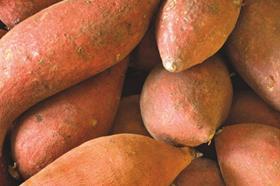
After several years of double-digit sales growth, value sales in the sweet potato category have gone into decline in 2017.
Revenues decreased by 4.1 per cent in the 52 weeks to 10 September, despite the fact that volume sales remained stable, rising by 0.7 per cent according to Kantar.
This marks the end of a steady sales trajectory for the vegetable, which started to enjoy major year-on-year sales rises when it was championed as a superfood back in 2009.
Hard-hitting promotions may have encouraged new consumers to buy into the category, but they have also deflated the market, making value-added products “key to driving value back into the category”, according to Barfoots’ supply chain product manager Ketan Dave.
Low prices have hurt some producers, among them North Carolina-based grower Southern Produce, which mainly exports the conventional Covington variety to European markets such as the UK, Germany, Scandinavia and France.
“Prices started falling about a year ago,” said Southern Produce president Kelley Precythe, “and at times they have been too low to ship. We’re 25 per cent export so that market is very important to us, but with some of the prices we had last year, nobody can be sustainable. I’m looking for the market to increase this year.”
Part of the problem, according to Precythe said, is that “there are a lot of suppliers shipping and too many people on the phones selling”, which has flooded the UK market.
In 2016 US sweet potato exports to the UK rose from 80,900 tonnes to 114,200t, and while this hike in demand is encouraging on the one hand, on the other it appears to have contributed to a reduction in prices.
Precythe welcomed a 10,000-acre reduction in planted area this season.
Rising demand, which saw year-on-year sales growth reach 25.9 per cent in the 52 weeks to 13 September 2015, has encouraged growers in key growing regions such as North Carolina, Central America and Senegal to increase production in recent years. And this had lead to increased commoditisation of the wholehead category in the UK.
Precythe is confident that although the British market has contracted slightly in the past year, product innovation, coupled with the vegetable’s positive health message, will help bring renewed growth to the category.
“The main issues will be staying sustainable and charging a fair market price so that everybody in the supply chain can make a bit of money,” he said.



